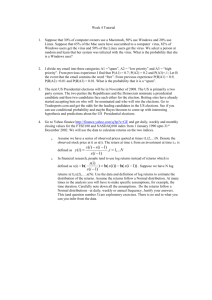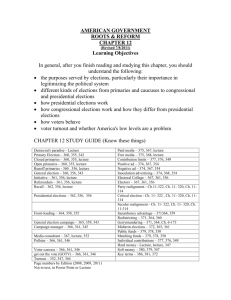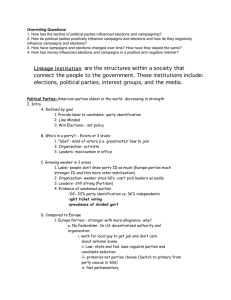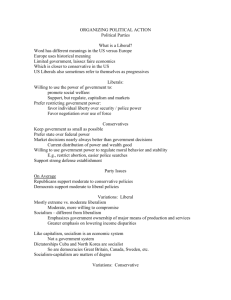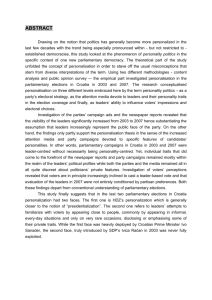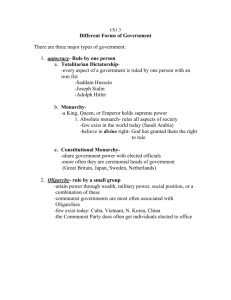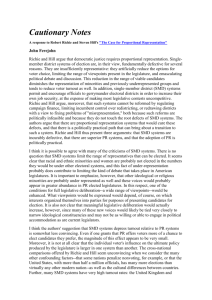AP Government Review Guide Chapters 9 & 10 (Political Parties
advertisement
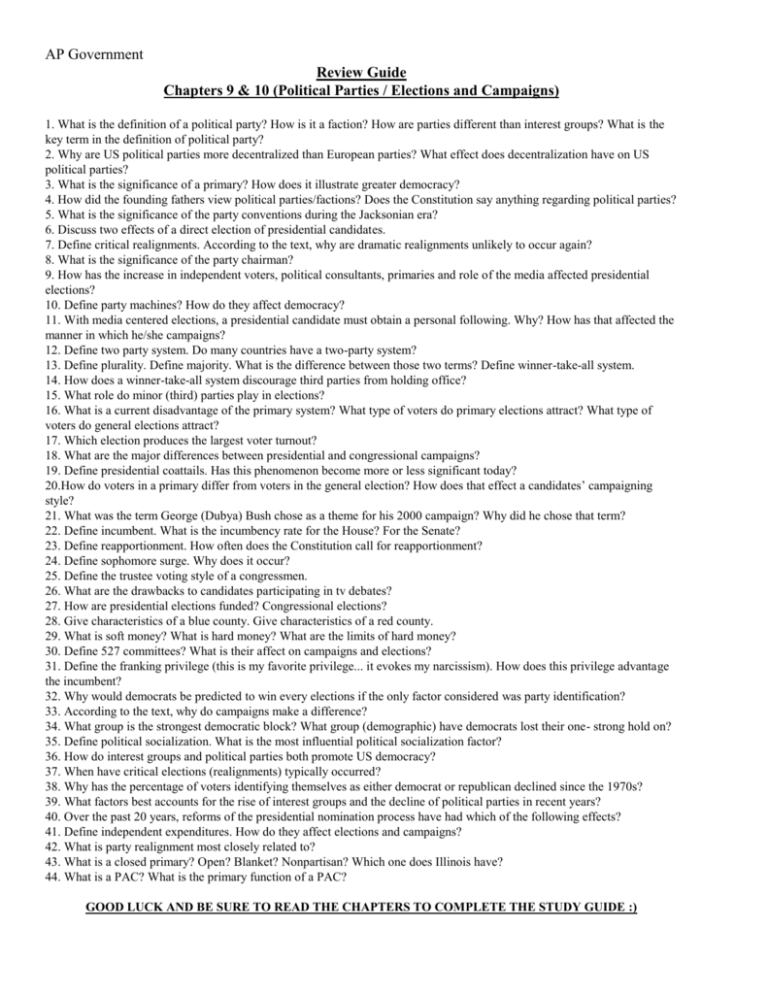
AP Government Review Guide Chapters 9 & 10 (Political Parties / Elections and Campaigns) 1. What is the definition of a political party? How is it a faction? How are parties different than interest groups? What is the key term in the definition of political party? 2. Why are US political parties more decentralized than European parties? What effect does decentralization have on US political parties? 3. What is the significance of a primary? How does it illustrate greater democracy? 4. How did the founding fathers view political parties/factions? Does the Constitution say anything regarding political parties? 5. What is the significance of the party conventions during the Jacksonian era? 6. Discuss two effects of a direct election of presidential candidates. 7. Define critical realignments. According to the text, why are dramatic realignments unlikely to occur again? 8. What is the significance of the party chairman? 9. How has the increase in independent voters, political consultants, primaries and role of the media affected presidential elections? 10. Define party machines? How do they affect democracy? 11. With media centered elections, a presidential candidate must obtain a personal following. Why? How has that affected the manner in which he/she campaigns? 12. Define two party system. Do many countries have a two-party system? 13. Define plurality. Define majority. What is the difference between those two terms? Define winner-take-all system. 14. How does a winner-take-all system discourage third parties from holding office? 15. What role do minor (third) parties play in elections? 16. What is a current disadvantage of the primary system? What type of voters do primary elections attract? What type of voters do general elections attract? 17. Which election produces the largest voter turnout? 18. What are the major differences between presidential and congressional campaigns? 19. Define presidential coattails. Has this phenomenon become more or less significant today? 20.How do voters in a primary differ from voters in the general election? How does that effect a candidates’ campaigning style? 21. What was the term George (Dubya) Bush chose as a theme for his 2000 campaign? Why did he chose that term? 22. Define incumbent. What is the incumbency rate for the House? For the Senate? 23. Define reapportionment. How often does the Constitution call for reapportionment? 24. Define sophomore surge. Why does it occur? 25. Define the trustee voting style of a congressmen. 26. What are the drawbacks to candidates participating in tv debates? 27. How are presidential elections funded? Congressional elections? 28. Give characteristics of a blue county. Give characteristics of a red county. 29. What is soft money? What is hard money? What are the limits of hard money? 30. Define 527 committees? What is their affect on campaigns and elections? 31. Define the franking privilege (this is my favorite privilege... it evokes my narcissism). How does this privilege advantage the incumbent? 32. Why would democrats be predicted to win every elections if the only factor considered was party identification? 33. According to the text, why do campaigns make a difference? 34. What group is the strongest democratic block? What group (demographic) have democrats lost their one- strong hold on? 35. Define political socialization. What is the most influential political socialization factor? 36. How do interest groups and political parties both promote US democracy? 37. When have critical elections (realignments) typically occurred? 38. Why has the percentage of voters identifying themselves as either democrat or republican declined since the 1970s? 39. What factors best accounts for the rise of interest groups and the decline of political parties in recent years? 40. Over the past 20 years, reforms of the presidential nomination process have had which of the following effects? 41. Define independent expenditures. How do they affect elections and campaigns? 42. What is party realignment most closely related to? 43. What is a closed primary? Open? Blanket? Nonpartisan? Which one does Illinois have? 44. What is a PAC? What is the primary function of a PAC? GOOD LUCK AND BE SURE TO READ THE CHAPTERS TO COMPLETE THE STUDY GUIDE :)

